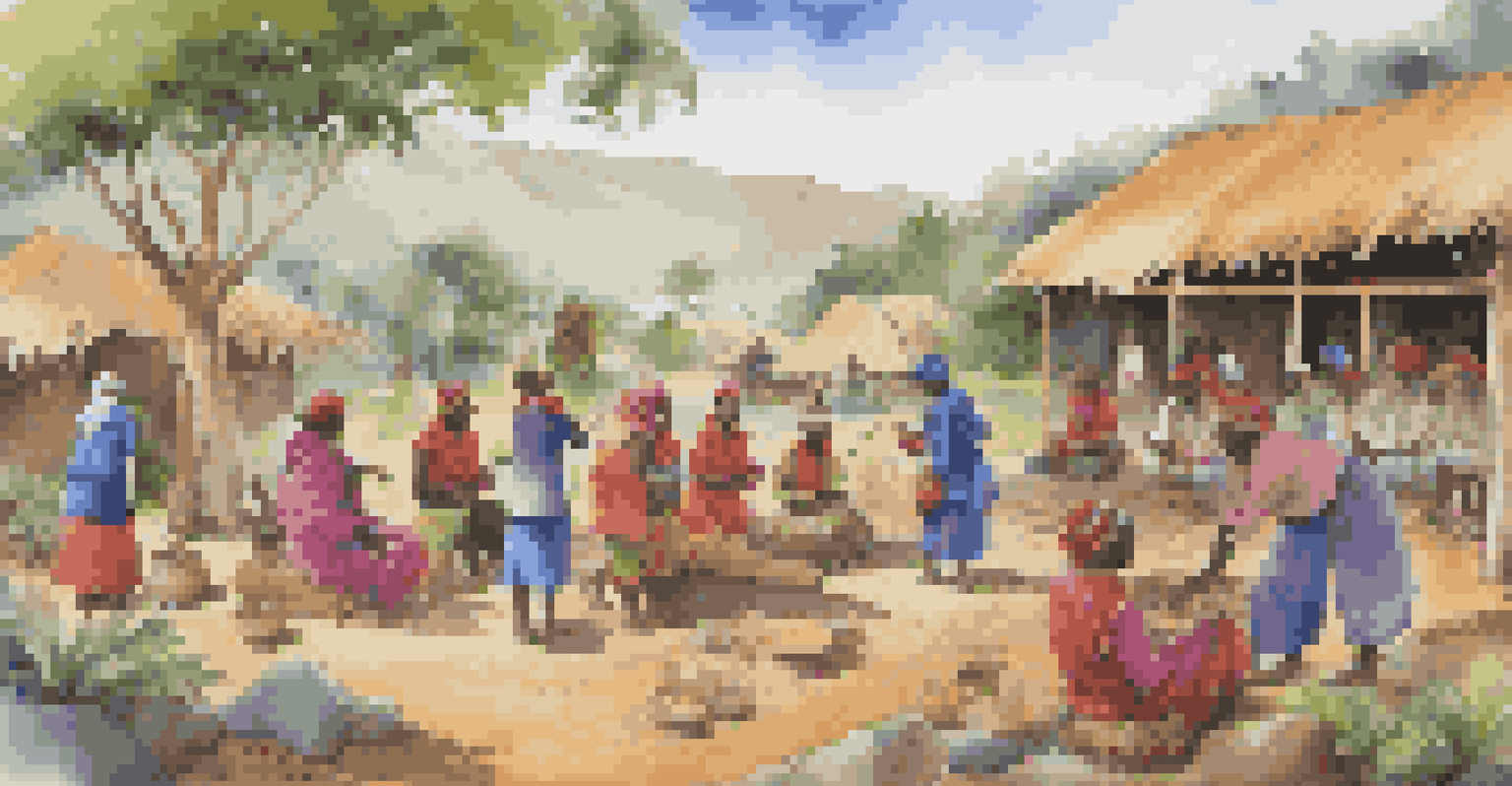Hands-On Conservation: Travel to Protect Natural Resources

Understanding Hands-On Conservation Efforts
Hands-on conservation combines travel and active participation in protecting natural resources. It allows travelers to immerse themselves in local ecosystems while making a tangible impact. This approach not only benefits the environment but also enriches the travel experience.
The greatest threat to our planet is the belief that someone else will save it.
By engaging directly with conservation projects, travelers gain a deeper appreciation for the challenges faced by wildlife and habitats. For instance, participating in reforestation efforts helps travelers understand the vital role trees play in carbon sequestration and biodiversity. This kind of firsthand experience fosters a sense of responsibility toward environmental stewardship.
Moreover, hands-on conservation often involves collaboration with local communities, ensuring that efforts are culturally sensitive and beneficial. This symbiotic relationship enhances the effectiveness of conservation initiatives while providing travelers with unique insights into local traditions and practices. It's a win-win for both the planet and its people.
Choosing the Right Conservation Travel Programs
Not all conservation travel programs are created equal, so it's essential to choose wisely. Look for organizations that prioritize sustainability and ethical practices in their projects. Researching the program's impact and past successes can help ensure your efforts lead to meaningful change.

Consider programs that offer a variety of activities, such as wildlife monitoring, habitat restoration, or community education. This diversity allows you to experience different aspects of conservation while contributing your skills effectively. Plus, it keeps your adventure fresh and exciting!
Hands-On Conservation Enriches Travel
Engaging in hands-on conservation allows travelers to actively contribute to environmental protection while deepening their appreciation for local ecosystems.
Additionally, seek programs that provide training and support for volunteers. Quality programs often equip their participants with the necessary skills and knowledge to maximize their contributions. This preparation not only boosts your confidence but also ensures that your efforts are aligned with the goals of the conservation project.
Benefits of Participating in Conservation Travel
Participating in conservation travel offers numerous benefits beyond environmental impact. One of the most significant advantages is the opportunity to connect with like-minded individuals who share your passion for nature and sustainability. These connections can lead to lasting friendships and collaborations in the future.
We do not inherit the earth from our ancestors; we borrow it from our children.
Another benefit is the chance to gain practical skills that can enhance your personal and professional life. Whether you're learning about wildlife tracking, sustainable farming, or marine biology, these experiences can enrich your knowledge and enhance your resume. It's an investment in yourself while making a difference.
Moreover, these trips often promote mental well-being by allowing travelers to disconnect from everyday stressors and immerse themselves in nature. Engaging with the environment can be a powerful way to recharge and gain perspective. Ultimately, conservation travel fosters a deeper connection to the planet and a renewed sense of purpose.
Inspiring Stories from Conservation Travelers
The stories of those who have engaged in hands-on conservation are truly inspiring. Many travelers return home with transformative experiences that reshape their perspectives on life and nature. For example, a volunteer who helped rehabilitate injured sea turtles in Costa Rica often shares how the experience ignited a lifelong passion for marine conservation.
These stories highlight the profound impact that hands-on conservation can have, not only on the environment but also on individual lives. Participants often recount moments of awe, like witnessing a baby turtle's first journey to the ocean or participating in a community-led wildlife census. Such experiences can be life-changing and serve as powerful motivators for ongoing environmental advocacy.
Choose Ethical Conservation Programs
Selecting programs that prioritize sustainability and community involvement ensures meaningful contributions and a positive impact on local environments.
Additionally, these narratives can inspire others to take action. When people hear about the joy and fulfillment that can come from these experiences, it encourages them to consider their own involvement in conservation efforts. Each story is a reminder that anyone can make a difference, one trip at a time.
The Role of Local Communities in Conservation
Local communities play a critical role in conservation efforts, as they often possess invaluable knowledge of their ecosystems. By involving community members in conservation projects, travelers can help ensure that initiatives are both effective and culturally relevant. This not only strengthens conservation efforts but also empowers locals.
For instance, in many regions, indigenous communities have been stewards of the land for generations. Their traditional practices and deep understanding of local flora and fauna can greatly enhance conservation strategies. When travelers collaborate with these communities, they gain insights that can lead to more sustainable solutions.
Moreover, supporting local communities through conservation travel can lead to economic benefits. By creating job opportunities in ecotourism and conservation, travelers help foster sustainable livelihoods. This approach not only protects the environment but also promotes social equity, making conservation a more holistic endeavor.
Practical Tips for Hands-On Conservation Travel
Planning a hands-on conservation trip requires a bit of research and preparation. Start by identifying destinations that align with your interests, whether it's marine conservation, wildlife preservation, or habitat restoration. Websites and travel blogs dedicated to conservation travel can provide valuable insights and recommendations.
Once you've chosen a program, pack appropriately for your activities. Depending on your destination, you may need specialized gear for outdoor work or specific clothing for cultural sensitivity. Being well-prepared not only enhances your experience but also demonstrates respect for the local environment and communities.
Community Collaboration is Key
Involving local communities in conservation efforts enhances the effectiveness of projects and promotes economic benefits through ecotourism.
Finally, maintain an open mind and a willingness to learn. Every conservation project comes with its own set of challenges and successes, and being adaptable can lead to a richer experience. Embrace the unexpected, and remember that your efforts, no matter how small, contribute to a larger movement toward protecting our planet.
The Future of Conservation Travel
As awareness of environmental issues grows, the future of conservation travel looks promising. More travelers are seeking out meaningful experiences that allow them to contribute to environmental protection while exploring new places. This trend signals a shift toward more responsible tourism practices that prioritize sustainability.
Innovations in conservation methods and technology also enhance the potential for impactful travel. For example, drone technology can be utilized for wildlife monitoring and habitat assessment, allowing volunteers to engage in cutting-edge conservation efforts. Such advancements can make hands-on conservation more effective and accessible.

Ultimately, the future of conservation travel lies in collaboration—between travelers, local communities, and conservation organizations. By working together, we can create a sustainable model that not only protects our natural resources but also enriches the travel experience. With every trip, we can move closer to a healthier planet.